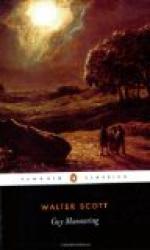‘I wot weel it’s no twenty years,’ said the landlady; ’it’s no abune seventeen at the outside in this very month. It made an unco noise ower a’ this country; the bairn disappeared the very day that Supervisor Kennedy cam by his end. If ye kenn’d this country lang syne, your honour wad maybe ken Frank Kennedy the Supervisor. He was a heartsome pleasant man, and company for the best gentlemen in the county, and muckle mirth he’s made in this house. I was young then, sir, and newly married to Bailie Mac-Candlish, that’s dead and gone (a sigh); and muckle fun I’ve had wi’ the Supervisor. He was a daft dog. O, an he could hae hauden aff the smugglers a bit! but he was aye venturesome. And so ye see, sir, there was a king’s sloop down in Wigton Bay, and Frank Kennedy, he behoved to have her up to chase Dirk Hatteraick’s lugger—ye’ll mind Dirk Hatteraick, Deacon? I daresay ye may have dealt wi’ him—(the Deacon gave a sort of acquiescent nod and humph). He was a daring chield, and he fought his ship till she blew up like peelings of ingans; and Frank Kennedy, he had been the first man to board, and he was flung like a quarter of a mile off, and fell into the water below the rock at Warroch Point, that they ca’ the Gauger’s Loup to this day.’
‘And Mr. Bertram’s child,’ said the stranger, ’what is all this to him?’
‘Ou, sir, the bairn aye held an unco wark wi’ the Supervisor; and it was generally thought he went on board the vessel alang wi’ him, as bairns are aye forward to be in mischief.’
‘No, no,’ said the Deacon, ’ye’re clean out there, Luckie; for the young Laird was stown away by a randy gipsy woman they ca’d Meg Merrilies—I mind her looks weel—in revenge for Ellangowan having gar’d her be drumm’d through Kippletringan for stealing a silver spoon.’
‘If ye’ll forgieme, Deacon,’ said the precentor, ’ye’re e’en as far wrang as the gudewife.’
‘And what is your edition of the story, sir?’ said the stranger, turning to him with interest.
‘That’s maybe no sae canny to tell,’ said the precentor, with solemnity.
Upon being urged, however, to speak out, he preluded with two or three large puffs of tobacco-smoke, and out of the cloudy sanctuary which these whiffs formed around him delivered the following legend, having cleared his voice with one or two hems, and imitating, as near as he could, the eloquence which weekly thundered over his head from the pulpit.
’What we are now to deliver, my brethren,—hem—hem,—I mean, my good friends,—was not done in a corner, and may serve as an answer to witch-advocates, atheists, and misbelievers of all kinds. Ye must know that the worshipful Laird of Ellangowan was not so preceese as he might have been in clearing his land of witches (concerning whom it is said, “Thou shalt not suffer a witch to live"), nor of those who had familiar spirits, and consulted with divination, and sorcery, and lots, which is the fashion with the Egyptians, as they ca’ themsells, and other unhappy bodies, in this our country. And the Laird was three years married without having a family; and he was sae left to himsell, that it was thought he held ower muckle troking and communing wi’ that Meg Merrilies, wha was the maist notorious witch in a’ Galloway and Dumfries-shire baith.’




